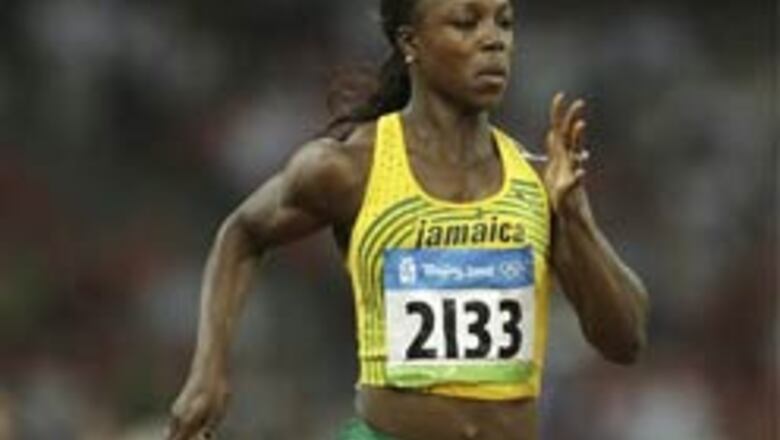
views
Beijing: Jamaica celebrated Usain "Lightning" Bolt's double sprint Olympic victory and set their sights on yet more track glory in China on Thursday.
Bolt was again the toast of his Caribbean homeland with a blistering 200 meters win at the end of Wednesday's action that broke American sprinter Michael Johnson's 1996 world record.
Added to his earlier 100m victory, that made Bolt the first man since America's Carl Lewis in 1984 to win the double and cemented Jamaica's reputation for speed as well as reggae.
"I'm No. 1," the joyous athlete mouthed at cameras, thumping his chest and blowing kisses at the 91,000 Bird's Nest crowd.
They sang "Happy Birthday" to Bolt, who is 22 on Thursday.
In a remarkable double disqualification causing debate into the early hours, Americans Shawn Crawford and Walter Dix came fourth and fifth after Bolt but took silver and bronze when two athletes ahead were disqualified for running out of lanes.
The Jamaican, variously dubbed the "U-Bolt" and "Insane Usain", may now return to the track and try for a third gold in the 4x100mm en's relay on Friday.
Before then, the limelight turns to Jamaica's similarly high-achieving women in Thursday's 200m showdown.
Jamaican women have already swept the 100m medals.
The joint silver medallists from that race, Sherone Simpson and Kerron Stewart, plus defending champion Veronica Campbell-Brown, will lead the Jamaican charge in the 200m at 1930 PM (local time) (1130 GMT) on Day 12 of the Games in the Bird's Nest.
In a Jamaica versus US speed showdown, world champion Allyson Felix, Muna Lee and Marshevet Hooker are the ones hoping to regain sprinting pride for the sport's traditional superpower.
Campbell-Brown was relishing the chance to bring more gold home.
"Over the years, Jamaica is very strong, and I think everyone is just working very hard," she said.
Also looming on Thursday is the 110 metres hurdles final, which was shaping into one of the high points of the Games but is now deflated by the absence of China's Liu Xiang.
The Olympic champion limped off injured during a heat, leaving Chinese fans in tears and clearing the way for Cuban world record-holder Dayron Robles.
"I'm very calm. I'll win the gold medal," he said.
Chinese power
The Chinese can at least console themselves with a look at the gold medal table, where they have built up a seemingly unassailable lead of 45.
The hosts' new sporting superpower status mirrors their growing global economic and political clout.
On a packed day of athletics, Americans Jeremy Wariner and LaShawn Merrit go head-to-head in the 400m on Thursday too.
The decathlon starts with 100 metres rounds, where Czech world record holder and Olympic champion Roman Sebrle will test his battered body once again in athletics' most gruelling event.
He was speared in the shoulder by a javelin in early 2007.
Away from the track, beach volleyball has been a hit in China, with the tanned players, scantily-clad entertainers and rock music drawing crowds in a carnival atmosphere.
Defending champions and triple world title holders Misty May-Treanor and Kerri Walsh of the United States take on China's top team in the women's final.
US women also figure in the football final against Brazil, hoping to repeat their victory against the South Americans in Athens four years ago.
"We're pumped. Bring it on," said midfielder Heather O'Reilly.
Bombarded with criticisms over pollution and human rights in the Games run-up, China's Communist government must be delighted with the near-total focus on sport since the Olympics started.
While the hosts will probably be remembered for fantastic organisation and an overall medals win, there is no doubt which individuals will be forever associated with Beijing 2008: Jamaica's Bolt and American swimmer Michael Phelps.
Bolt refused to be drawn into comparisons with Phelps, who won an unprecedented eight golds at the Games.
"I'm on the track, he's in the water, so we can't compare that pretty much, but he's a great athlete and I congratulate him," Bolt said.
With Phelps having achieved what nobody has done before -- eight golds in one Games and 14 Olympic golds in his career -- the world has been wondering just what makes such a man.
Unfortunately for mere mortals, such success depends largely on natural brilliance as well as all the years of training, according to his coach and mentor Bob Bowman.
He described first seeing Phelps's unmatched swimming ability at the age of 11.
"I'd never seen anything like it and when I went home that night I couldn't sleep I was so excited," he said. "But of course I didn't tell him that." The rest, as we now know, is history.




















Comments
0 comment